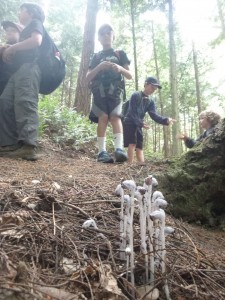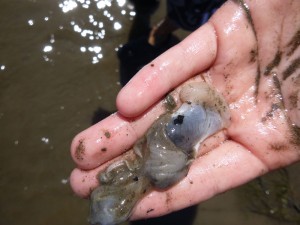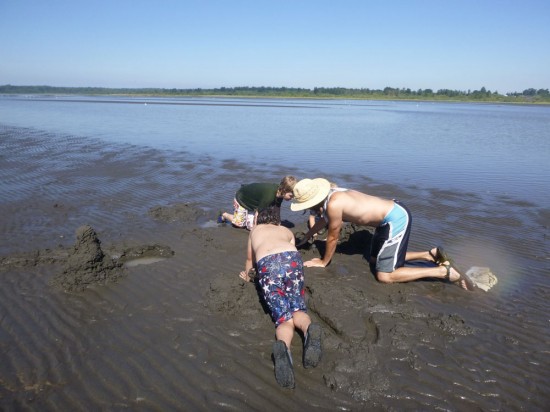Holding the Space: Supporting Our Children’s Innate Sense of Wonder
“If a child is to keep alive his inborn sense of wonder, he needs the companionship of at least one adult who can share it, rediscovering with him the joy, excitement, and mystery of the world we live in.”
— Rachel Carson, The Sense of Wonder (1965)
When the boys were exploring the side of the creek last week, I couldn’t help but think of Rachel Carson and her words of wisdom. I watched as my twelve nine-year old mentees took to Whatcom Creek like it was their birthright. The next thing I knew, I was diving off a rock with seven boys into the refreshing water. Three others used dip nets to catch water striders while another mentor was showing them the three crawdads he caught. The last two were running along the banks in their own little worlds, ducking under tree limbs and splashing along the edges.
The work I’ve done as a nature connection mentor for the Boys Explorers Club program of Wild Whatcom has changed my approach to environmental education and to being a teacher. Over the past two years I have moved from an objective-based model to simply being a supportive guide. I still have goals for my participants and I still assess their learning, but I have come to realize that it is not my instruction that teaches them.
My role is to simply hold the space for them to learn on their own. Their first-hand experiences in our local Bellingham city and Whatcom County parks develop unique relationships with the watersheds, amphibians, trees, birds, and plants. And it is THOSE natural elements that are their teachers.
 Recently Explorers’ curiosity led them to inquire about Indian Pipe (Monotropa uniflora) growing on the forest floor. They wondered if it was a plant because it isn’t even green. I started to pontificate about rhizomal relationships with conifers, habitat considerations, and that the plant has been used as medicine. But the boys will undoubtedly remember this ghostly plant more because it is said that Indian Pipe grows where wolves have urinated. That made them laugh.
Recently Explorers’ curiosity led them to inquire about Indian Pipe (Monotropa uniflora) growing on the forest floor. They wondered if it was a plant because it isn’t even green. I started to pontificate about rhizomal relationships with conifers, habitat considerations, and that the plant has been used as medicine. But the boys will undoubtedly remember this ghostly plant more because it is said that Indian Pipe grows where wolves have urinated. That made them laugh.
Later in the week, when an Explorer accidentally broke open a clam shell while digging in the mud, he learned about shellfish biology and how delicate those animals are. In addition, and perhaps more importantly, he practiced compassion for another living being and the skill of forgiving himself for hurting that creature. He might have learned about clam biology if we had dissected some using a scientific investigatory approach that I prepared for them. However, he’d have missed a chance for vital interpersonal growth that came from his own exploration and experience.
 So I have to let go of my objectives to teach the boys about plants because I never know what will spark their interest as we wander through the forest together. I can share knowledge from my adult perspective and perhaps nuggets of information will root into their heads so they can recall it later. But by just being there alongside them, as Rachel Carson encourages, l am rediscovering the mystery with them, fostering their sense of wonder and ability to learn on their own.
So I have to let go of my objectives to teach the boys about plants because I never know what will spark their interest as we wander through the forest together. I can share knowledge from my adult perspective and perhaps nuggets of information will root into their heads so they can recall it later. But by just being there alongside them, as Rachel Carson encourages, l am rediscovering the mystery with them, fostering their sense of wonder and ability to learn on their own.
———
Our afterschool program called Neighborhood Nature is another opportunity for students to get outside with adult companions, as boys and girls explore natural areas near their schools. One second grade girl’s words speak clearly to the importance of this work. When we walked to the nearby park one Monday afternoon she told me, “I’m bored.” After a day of stimulation in school her nervous system was very amped up. She was ready for the next entertainment or thing to do. When she said it again, I replied, “Good.”
“No, I am not supposed to be bored,” she said, implying that as an adult it was up to me to make sure she had something to do. I just smiled and told her that I thought it was good that she was bored. She dismissed me with a huff and then sat down in the dirt. And there the magic happened.
In previous years I would have given her a task and helped her to accomplish it, having some objectives for her growth in my head. It would have been a contrived way for me to teach her something that she may or may not have wanted to learn. Instead, I observed her physical response to boredom and the subsequent transformation.
(article continues below)
She sat down in the dirt and then her nervous system slowed down. Naturally her hands fidgeted with the dirt. Soon she looked up to see another girl digging a hole in the ground near her. She watched for a moment and then asked to join in digging a tunnel and then creating a burrow and home for an unknown animal. The girls connected and laughed together while playing in the dirt. They too practiced compassion in making a home for another living being in the forest, one they hadn’t even seen. They practiced intrapersonal skills and learned how to work well with one another.
Had I gone into my previous teacher mode and tasked her with something to do, then this authentic learning would have been lost. Once her body slowed down and her amped-up nervous system relaxed, her curiosity took over and her social tendencies took over. This girl had to be “bored” and I had to let it happen. As a supportive guide the best course of action for me was to deliberately take no action. When it was time to head back to school to meet the parents, it was all I could do to cajole her into leaving so the groups wouldn’t be more than 10 minutes late.
 This is a reminder to all of us that we have to let go of the adult agenda in education. Our children know how to learn; they simply need the space to do so. They need us to let them be bored so their curiosity can show up. And it is us who ought to be present and engaged with their curiosity. We may have scientific and logical answers to teach and share but we may have forgotten the mystery that our children are exploring for the first time.
This is a reminder to all of us that we have to let go of the adult agenda in education. Our children know how to learn; they simply need the space to do so. They need us to let them be bored so their curiosity can show up. And it is us who ought to be present and engaged with their curiosity. We may have scientific and logical answers to teach and share but we may have forgotten the mystery that our children are exploring for the first time.
Like Carson says, a child needs an adult with whom to share and discover the joys and mystery of this world. But we adults should recognize that we need the children to remind us of the magic and mystery in our natural world. We have to be OK with slowing down, being bored and being present with our children so we can rediscover what we learned as children.
David Strich is the Program Coordinator for the Boys Explorers Club program of Wild Whatcom. He lives in Bellingham, Washington with his wife and can be reached at d.strich@gmail.com



